10 Best Vegetarian Protein Sources to Fuel Your Body

Eating a vegetarian or vegan diet packed with protein is key to keeping your energy up and supporting an active lifestyle. Are you worried about getting enough protein from plant-based foods? No sweat – there are loads of tasty veggie protein options to satisfy your needs!
What is vegetarian protein, and why do you need it?
Protein is an essential macronutrient made up of amino acids that helps build and repair tissues and muscles in the body. Getting adequate protein on a vegetarian diet helps preserve lean muscle mass, keeps you feeling full between meals, stabilizes blood sugar, and provides lasting energy.
Animal products such as meat, eggs, and dairy are rich in protein, but you can meet all your protein needs with plant-based sources. When combining different plant proteins like beans, nuts, seeds, and whole grains over the course of a day, you can easily meet recommended protein intake levels.
How much protein does a vegetarian need per day?
The protein RDA is 0.8 grams per kg of body weight or 0.36 grams per pound. For example, at 150 pounds (68.04 kg), you need around 54 grams of protein daily.
Active individuals or athletes require a higher protein intake—about 1.2 to 2.0 grams of protein per kilogram of body weight per day. Pregnant or breastfeeding women also have increased protein needs.
A Complete Protein Source
Did you know there are 20 amino acids that come together to form protein strands? Nine of these are essential amino acids that the body cannot produce on its own and must get through the diet.
Complete protein sources contain all nine essential amino acids. Animal foods like meat, eggs, and dairy are complete proteins. Among plant foods, only soybeans, quinoa and a few others provide complete proteins.
By eating a varied diet of complementary incomplete vegetarian protein sources like beans and rice or hummus and whole grain pita, you can meet all your essential amino acid requires over the course of a day.
10 Best Vegetarian Protein Sources
1. Tofu and Tempeh
Tofu and tempeh are soy-based vegetarian protein sources made from soybeans. Both are excellent sources of complete protein, with about 8–10 grams of protein per 3 ounces (113.4 g). Soy foods also contain fiber and key micronutrients like calcium, iron and magnesium.
Try crumbled firm tofu in stir-fries, scrambled tofu for breakfast, or marinated baked tempeh. Edamame beans (immature green soybeans) also supply about 8 to 10 grams protein per half cup.
2. Lentils
All types of lentils including red, brown, black, and green are protein powerhouses, providing about 18 grams of protein per cooked cup. Lentils are rich in leucine, an amino acid that helps stimulate muscle protein synthesis.
Enjoy lentils in soups, stews, salads, or blended into veggie burgers. Try cooking them with aromatics like garlic, onion, spices, and herbs. Pair with grains like rice or use in dals with Indian spices for complete proteins.
3. Beans and Legumes
Kidney beans, pinto beans, black beans, chickpeas, black-eyed peas and all varieties of beans supply excellent vegetarian protein. They contain 10-15 grams protein per cooked cup along with lots of fiber, vitamins and minerals like iron, magnesium and potassium.
Beans are extremely versatile. Enjoy them on salads, in chili, blended into dips and spreads like hummus, roasted as snacks or made into veggie burgers.
4. Nuts and Nut Butters
Almonds, pistachios, walnuts, cashews, and nut butters are high calorie, nutrient-dense sources of plant-based protein. Nuts provide 6-7 grams protein per ounce with healthy unsaturated fats, fiber and various vitamins and minerals.
Try nut butter and chia seed or flaxseed sandwiches, pine nut pesto pasta, cashew cream sauces, almond milk, or trail mixes with nuts, seeds and dried fruit for an on-the-go protein snack.
5. Seeds
Chia, hemp, and flax seeds contain protein, omega-3 fatty acids and fiber. Sesame, pumpkin, and sunflower seeds also supply plenty of iron, zinc, magnesium, and vitamin E. Seeds offer 8-12 grams protein per ounce.
Sprinkle chia and hemp seeds into smoothies, oatmeal, and salads, or use ground flax meal in baked goods. Tahini (sesame seed paste) makes a rich addition to hummus, sauces and dressings.
6. Quinoa
Quinoa is an ancient grain that contains all nine essential amino acids, making it a complete vegetarian protein. Just 1 cup (0.24 l) of cooked quinoa provides about 8 grams protein, along with anti-inflammatory phytonutrients like quercetin and kaempferol.
This fluffy, nutrient-dense grain has a pleasant, mild flavor. Use it in place of rice in pilafs, as a base for Buddha bowls, or try adding it to soups and salads for a protein and fiber boost.
7. Ezekiel Bread
Sprouted whole grain breads like Ezekiel bread offer higher protein than regular whole grain breads, with about 4 grams per slice. The sprouting process breaks down anti-nutrients like phytic acid to make the protein more bioavailable and minerals easier to absorb.
Use sprouted bread for avocado or nut butter toast, sandwiches, French toast or get creative with bruschetta topped with beans, lentils, or tempeh crumbles. Look for organic, sprouted breads to avoid preservatives and added sugars.
8. Nutritional Yeast
This deactivated yeast acts like a seasoning with a savory, cheesy umami flavor. Nutritional yeast flakes offer about 9 grams complete vegetarian protein per 2 tablespoons, along with vitamin B12, a nutrient that can be difficult to get from plant foods.
Stir nutritional yeast into mashed potatoes, pasta sauces, soups and stews. Use it to make rich, dairy-free sauces or sprinkle it on popcorn for flavor and protein.
9. Spirulina
This antioxidant-rich freshwater blue-green algae contains about 7 grams complete protein per tablespoon along with good amounts of B vitamins, beta-carotene, minerals like iron and manganese and numerous phytonutrients.
Add just 1 teaspoon spirulina powder per smoothie as an easy way to increase plant-based protein intake first thing in the morning. You can also use it to add protein, minerals, and a burst of natural color to chia puddings, homemade protein bars, juices and other recipes.
10. Protein Powders
Hemp, soy, brown rice and pea protein powders offer an easy way to boost your daily protein intake, especially if weight loss, athletic performance and muscle gain are your goals. These are often fortified with vitamins and minerals and contain 10–30 grams protein per serving.
Add them to smoothies, make protein balls or homemade protein bars, mix into oatmeal, or blend with nut milks to make protein shakes or hot chocolate. Choose unsweetened flavors to keep added sugars low.
Tips for Getting Enough Protein on a Vegetarian Diet
- Focus on getting plenty of protein-rich foods at each meal, especially beans, lentils, tofu, tempeh, nuts and seeds.
- Combine different plant proteins like whole grains with beans or nuts with leafy greens at meals to get a mix of essential amino acids.
- Include good vegetarian protein sources like chia seeds, nut butter or soy/pea protein powder in breakfasts to prevent energy crashes later on.
- Enjoy high protein snacks between meals like roasted chickpeas, hummus with entire grain pita, nut butter apple slices or Greek yogurt with fruit and nuts.
- If exercising heavily or trying to build muscle on a vegetarian diet, make sure to increase protein intake to meet increased needs. Consider a daily protein powder smoothie.
Eating a well-balanced mix of complete plant foods along with some key high protein vegetarian ingredients makes it easy to meet and even exceed protein needs. With a little planning, you can thrive on a vegetarian or vegan diet.

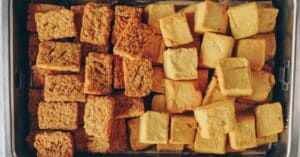
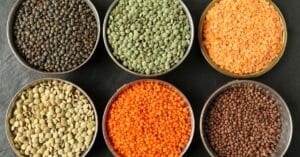
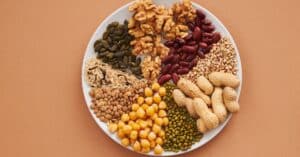

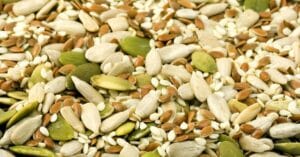

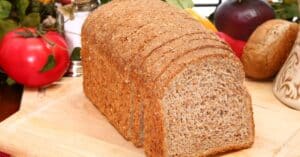
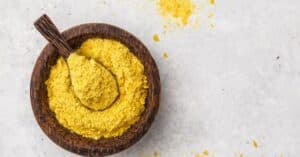
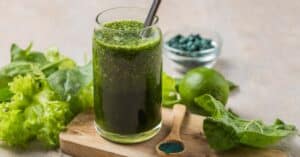
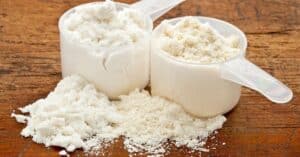
Leave a Reply